Art Destinations
Art Destinations is a podcast exploring art, place and belonging. Season 1 will begin in Venice where we interview artists and curators living and/or working in the Venetian lagoon. Season 2 and season 3 will then travel to Lutruwita | Tasmania and Sicily. We take the listener on a journey to purposefully understand a place through artists’ stories.
Art Destinations is a podcast exploring art, place and belonging. Season 1 will begin in Venice where we interview artists and curators living and/or working in the Venetian lagoon. Season 2 and season 3 will then travel to Lutruwita | Tasmania and Sicily. We take the listener on a journey to purposefully understand a place through artists’ stories.
Episodes

Tuesday Jun 03, 2025
Tuesday Jun 03, 2025
Alfio Puglisi in conversation with podcast host Sarah Rhodes on how the Sicily Artist in Residence Program (SARP) is transforming Sicily into a global hub for contemporary art through site-specific residencies, local collaboration, and atmospheric place-making.
In this wide-ranging conversation, Sarah Rhodes speaks with the podcast’s co-producer Alfio Puglisi — founder of the Sicily Artist in Residence Program (SARP) — about returning to his ancestral home on the slopes of Mount Etna to forge a new vision for contemporary art in Sicily. Alfio shares his remarkable journey: from studying economics and the digital economy and society at King’s College London to teaching in Lisbon, and ultimately leaving behind a secure academic career to pursue something more entrepreneurial and creatively rooted. That shift led him back to Linguaglossa, where he transformed his family’s 17th-century palazzo into a living museum, restaurant, contemporary gallery and residency program.
Through SARP, Alfio brings together international and local artists, offering them space, support, and time to develop site-responsive work. The program emphasises collaboration with local artisans, curators, and Sicilian production facilities, ensuring that exhibitions are deeply embedded in place. These are not parachute residencies, but long-form engagements that invite artists to slow down, adapt, and attune to Sicily’s layered histories and landscapes.
Together, they discuss:
The personal and political significance of returning home to begin again
Why Sicily’s “peripheral” location may actually be a place of focus and clarity for artists
The interplay between cultural memory, atmospheric conditions, and contemporary creative practice
The red Saharan rain that settles each spring on Sicilian gardens — and how this meteorological phenomenon became the digital pigment for new photographic work by Andre Hemer
How Alfio’s vision for SARP builds on both inherited history and future-facing cultural networks
The growing community of creatives — many returning from cities like London, Paris, and Berlin — who are reshaping Sicily’s role in the international art conversation
This episode offers a meditation on place, return and reinvention. As Alfio says, Sicily’s position at the centre of the Mediterranean offers not just geography, but perspective — a place to think, to feel, and to make without distraction.
Listen in as we reflect on the links between atmosphere and art-making, the value of community and continuity, and how peripheral places can become sites of deep cultural transformation.

Tuesday May 20, 2025
Ep 1: Sicily season premiere
Tuesday May 20, 2025
Tuesday May 20, 2025
In this premiere episode of Art Destinations Sicily, we introduce the artists and key themes that will be explored in season. We look at how artists engage with the layered geographies of Sicily — a place shaped by ancient myths, volcanic terrain, and a complex cultural inheritance. Through residencies and site-responsive projects, the artists featured in this season reveal how creative practice emerges from deep entanglements with land, memory, and material.
Our conversations begin with this podcast’s co-producer and Sicily Artist-in Residence Program (SARP) director Alfio Puglisi. And then we have the privilege of meeting Elisa Giardina Papa (Italy’s Venice Biennale 2022 artist), Vito Planeta (Planeta Wines), Irene Coppola (artist and Spaziomateria, Palermo), Francesco Vullo (artist), Claudio Gulli (art historian, Palazzo Butero, Palermo), Hanna Burkart (artist), Aurora Passero (artist) and Alessandro Giorgi (artist).
The key ideas are:
Collaborating with PlaceThe Sicilian landscape—particularly Mount Etna—acts not merely as a backdrop but as an active force shaping artistic practice. Across episodes, artists respond to the island’s geology, climate, and topography as both medium and subject.
Reimagining Cultural IdentityArtists explore Sicily’s layered histories, myths, and social taboos to question and reframe local identity. Folklore, symbolism, and personal narratives are reinterpreted through contemporary lenses to address belonging, memory, and transformation. 3. A Return to MaterialityThere is a strong return to material practices—textiles, volcanic rock, pigment, and site-specific installation—as a way to connect past and present. This material sensibility serves as a tactile bridge between tradition and experimentation. 4. Peripheral Networks and Global DialogueSicily’s perceived peripherality fosters a fertile ground for international collaboration. Through residencies and projects like SARP, artists from diverse backgrounds engage with the island to generate new models of exchange, intimacy, and creative dwelling.
The Sicily season reveals that working from the edge — whether spatially or culturally — creates rich opportunities to rethink place, practice, and belonging. Artists in this season treat the island not only as a site, but as a way of being.
We hope you enjoy this season of Art Destinations Sicily.
Each episode is released fortnightly. Subscribe to our newsletter, follow us on your preferred listening platform. such as Apple Podcasts or Spotify, and explore the visual works of our guests via @artdestinations.podcast on Instagram.
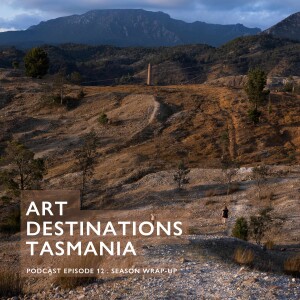
Tuesday Jan 21, 2025
Ep 12: Reflecting on the Lutruwita Tasmania season
Tuesday Jan 21, 2025
Tuesday Jan 21, 2025
We reflect on the Art Destinations Lutruwita | Tasmania season in a wrap-up episode that draws links between the 10 artists and writers in conversationacross the episodes. We also draw parallels between season 1 Venice and season 2 Lutruwita | Tasmania.
World leading philosopher on place Jeff Malpas lays the foundation for the Lutruwita | Tasmania season as his conversation frames the role of place in thinking. We examine how artists’ practices are shaped by cultural memory and the natural environment.
In this episode we cover: :
examine art as activism from the perspectives of Matthew Newton, David Stephenson and Raymond Arnold,
the role of isolation in forming a connection with nature, building community and finding resonances interationally as shared through the work of Troy Ruffels, Zoe Grey and Ellen Dahl,
imagination and place through Pat Brassington’s surreal works explore feminist themes while reflecting an imagined sense of place,
stories that give access to isolated worlds through Adam Thompson’s short stories based on his Indigenous culture and Lisa Garland’s stories behind the portraits of her North-West Coast community, and
we draw parallels between the Venice and Lutruwita | Tasmania seasons. In Venice, artists embrace marginality as a strength, collaborating on smaller islands in the lagoon to reimagine shared spaces. In Tasmania, geographical isolation inspires self-reflection and deep connection with the natural world.
In summary, being on the edge—geographically, culturally, or conceptually—offers unique opportunities for reflection, innovation, and meaningful engagement with place and environment. We explore how art thrives in these peripheral spaces.
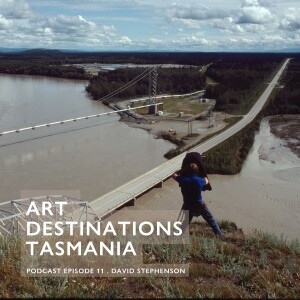
Tuesday Jan 07, 2025
Ep 11: David Stephenson on time and the sublime in photography
Tuesday Jan 07, 2025
Tuesday Jan 07, 2025
We are in conversation with US-born photographic artist David Stephenson, who received an MFA from the University of New Mexico in 1982 before taking a teaching position at the University of Tasmania’s School of Art. His work has consistently explored the sublime, in relation to his transcendental experience of place.
With an ongoing interest in human interventions in the landscape, David arrived in Tasmania in the lead-up to the Franklin Dam blockade and continues to document Tasmania’s contested places. He also experiments with the different ways the photographic image, and different subject matters, can represent time.
His work is in many permanent collections including the National Gallery of Australia, the National Gallery of Victoria, the Art Gallery of New South Wales, the Museum of Contemporary Art Australia, the San Francisco Museum of Modern Art, and both the Museum of Modern Art and the Metropolitan Museum of Art in New York.
David Stephenson is represented by Bett Gallery, Hobart, Jackson Fine Art, Atlanta and Boutwell Schabrowsky, Munich.
You can see David’s work on our instagram page @artdestinations.podcast
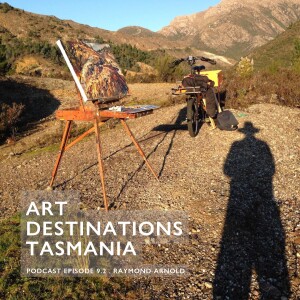
Tuesday Dec 31, 2024
Ep 10: Part 2 - Raymond Arnold on revitalising a region through art
Tuesday Dec 31, 2024
Tuesday Dec 31, 2024
This is the second part of our two-part conversation with Raymond Arnold. Raymond talks about his printmaking and painting practice, and how he shares his art practice with his community in Queenstown with the aim of revitalising the region.
In part one, Raymond gave us some background on why Lutruwita | Tasmania is such an important landscape and how it became an environmental batttleground.
For the listeners who have never been to Queenstown, it is an extremely isolated town on Lutruwita's west coast, surrounded by forest and mountain ranges. It is now a landscape healing after bearing scars from an energetic copper extraction and smelter operation starting at the turn of the 20th Century; which left the surrounding mountains bare and the rivers polluted.
In the late 1990s Raymond left teaching at the Tasmanian School of Art, and moved to Queenstown with his partner Helena Demczuk. Since then they have focused on their art practises and use art to revitalise the town.
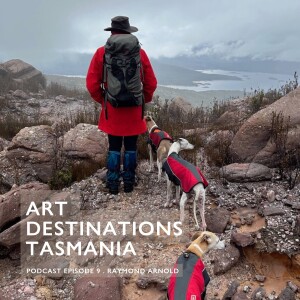
Tuesday Dec 24, 2024
Tuesday Dec 24, 2024
We are in conversation with the wonderful painter and printmaker Raymond Arnold, who has lived in Queenstown, on Lutruwita | Tasmania’s West Coast since the late 1990s with his wife Helena, Demczuk and their four whippets.
The conversation naturally shaped itself into two main themes: environmental activism and his art practice, so we have divided his podcast into two 35-minute parts.
In part one, Raymond explains his involvement in the Franklin Dam blockade. He had just taken a teaching position at the Tasmanian School of Art when he was invited to join the busload of artists travelling to protest against the damming of one of Tasmania’s last wild rivers. They were all among the 1300 arrested.
This formative experience contributed to Raymond’s intimate understanding of Tasmania as a social, political and environmental battleground.
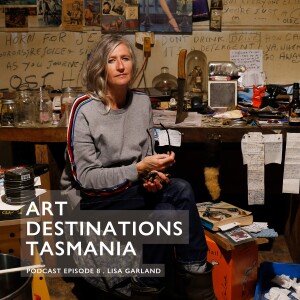
Tuesday Dec 10, 2024
Ep 8: Lisa Garland on photographing her community
Tuesday Dec 10, 2024
Tuesday Dec 10, 2024
We are in conversation with Lisa Garland, a photographic artist who has been documenting her community on the North-West Coast for more than 20 years. Lisa makes portraits of people so deeply connected to where they live that often the portrait of their place tells more about them than the people themselves. As a new generation is emerging and another passing, Lisa reflects on what she looks for in her subjects and how her focus is changing.
In this episode we cover:
how Lisa’s photographic portraits of people and places are influenced by her upbringing and community,
how Lisa’s early career as a newspaper photographer made her value her own personal projects, particularly portraits of her family and community members,
documenting generational changes occuring in Lutruwita | Tasmania, particularly during residencies in Queenstown and King Island,
how the intimate relationship between artist and subject comes through in her images and the extent the stories shared are conveyed through image and text,
the changes in Tasmania's cultural and physical landscapes and the loss of traditional craftsmanship,
her shift from portraiture to photographing symbolic spaces, and
the value of storytelling and the significance of preserving the authenticity of her subjects and their environments.
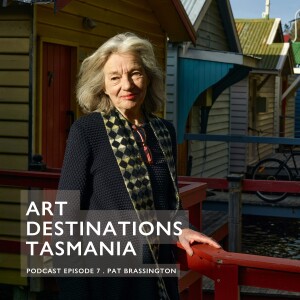
Tuesday Nov 26, 2024
Ep 7: Pat Brassington on childhood, the familiar and the fantastical
Tuesday Nov 26, 2024
Tuesday Nov 26, 2024
We are in conversation with Pat Brassington, one of Australia’s most significant and influential artists. Over four decades, Brassington has captivated audiences with her ability to transform the familiar into the fantastical through her enigmatic photomontages.
This conversation is recorded as a radio play where a voice artist performs Brassington’s responses to my questions.
In this episode we cover:
how Brassington’s childhood in Hobart has influenced her practice. At a young age, Brassington contracted polio. She was confined to her bedroom for six weeks and experienced a heightened feeling of isolation. This experience, in combination with catching tadpoles with her brother and playing in suburban backyards, sparked her artistic imagination.
how Tasmania and the concept of isolation influenced her artistic imagination,
Brassington’s exploration of contradictions, inspired by dialectics, surrealism and psychoanalysis,
her use of distortion, symbolism, and the provocative use of pink, and
insights into her lens-based practice, blending straight photography with manipulated images to evoke unsettling yet captivating emotions.





